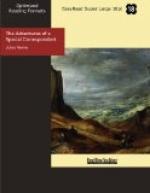As I passed along the dusty roads of the city, I entered at a venture any of the buildings I found open. Here it was a bazaar where they sold cotton materials of alternate colors called “al adjas,” handkerchiefs as fine as spider webs, leather marvelously worked, silks the rustle of which is called “tchakhtchukh,” in Bokhariot, a name that Meilhac and Halevy did wisely in not adopting for their celebrated heroine. There it was a shop where you could buy sixteen sorts of tea, eleven of which are green, that being the only kind used in the interior of China and Central Asia, and among these the most sought after, the “louka,” one leaf of which will perfume a whole teapot.
Farther on I emerged on the quay of the Divanbeghi, reservoirs, bordering one side of a square planted with elms. Not far off is the Arche, which is the fortified palace of the emir and has a modern clock over the door. Arminius Vambery thought the palace had a gloomy look, and so do I, although the bronze cannon which defend the entrance appear more artistic than destructive. Do not forget that the Bokhariot soldiers, who perambulate the streets in white breeches, black tunics, astrakan caps, and enormous boots, are commanded by Russian officers freely decorated with golden embroidery.
Near the palace to the right is the largest mosque of the town, the mosque of Mesjidi Kelan, which was built by Abdallah Khan Sheibani. It is a world of cupolas, clock towers, and minarets, which the storks appear to make their home, and there are thousands of these birds in the town.
Rambling on at a venture I reach the shores of the Zarafchane on the northeast of the town. Its fresh limpid waters fill its bed once or twice a fortnight. Excellent this for health! When the waters appear men, women, children, dogs, bipeds, quadrupeds, bathe together in tumultuous promiscuousness, of which I can give no idea, nor recommend as an example.
Going northwest towards the centre of the city, I came across groups of dervishes with pointed hats, a big stick in their hands, their hair straggling in the breeze, stopping occasionally to take their part in a dance which would not have disgraced the fanatics of the Elysee Montmartre during a chant, literally vociferated, and accentuated by the most characteristic steps.
Let us not forget that I went through the book market. There are no less than twenty-six shops where printed books and manuscripts are sold, not by weight like tea or by the box like vegetables, but in the ordinary way. As to the numerous “medresses,” the colleges which have given Bokhara its renown as a university—I must confess that I did not visit one. Weary and worn I sat down under the elms of the Divanbeghi quay. There, enormous samovars are continually on the boil, and for a “tenghe,” or six pence three farthings, I refreshed myself with “shivin,” a tea of superior quality which only in the slightest degree resembles that we consume in Europe, which has already been used, so they say, to clean the carpets in the Celestial Empire.




